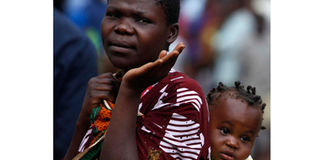Bududa rescue efforts near end

SOME HELP: A displaced woman carries her child as they wait to receive emergency supplies in Bududa village last week. Three local officials have been arrested for stealing relief items. PHOTO BY JAMES AKENA.
Bududa/Kampala
Officials in Bududa are considering ending the search for victims from last week’s landslide that left at least 89 people dead and thousands displaced. The search effort should end today or tomorrow, local authorities said yesterday, although President Museveni has reportedly given orders that it must continue.
With at least 350 people presumed dead, ending the search would mean that more than half of the dead will never be given a decent burial. More significantly, however, it also means that it will be forever impossible to know how many people actually died in the tragedy.
Within the humanitarian effort, which has attracted support from many quarters, including some United Nations agencies, there were lingering doubts about the accuracy of estimates given in the aftermath of the disaster.
The uncertainty over how many people died was also being carried over into the discussion of how many survivors now need emergency help, with the local officials presenting a figure seen by the authorities in Kampala as inflated.
Wake-up call
“It is very difficult to place a figure [on how many people died],” said Mr Musa Ecweru, the junior minister in charge of disaster preparedness. “We have had to rely on the local leaders, who have given a different account of the situation. That is how we came up with the figure of between 300 and 350. It is a wake-up call to all of us [to have reliable statistics]. It is a pity.”
Even when offered as mere estimates, some of the available figures make for grim reading and, if accepted as the truth, depict the search operation as a failure if it was intended to recover the dead. Maj. Gen. Julius Oketa, the national director for emergency coordination in the Prime Minister’s office, yesterday told a crisis meeting in Bududa that only President Museveni could authorise an end to the search operation. “The President has directed the Ministry of Works to send graders to level the road as retrieval of the bodies continues until he (stops) it himself,” said Maj. Gen. Oketa.
Such a decision flies in the face of expert advice, according to Dr. Peter Wakooba, Bududa’s top public health officer. “The landslide was very deep and the chances of retrieving the bodies have (slimmed) through the days,” he told Daily Monitor. “Hygienically, we are supposed to have stopped because after about five days, it is not healthy to continue removing the decomposing, smelling bodies.”
According to a summary report, dated March 4, compiled by the office of the Prime Minister, the village of Nametsi lost 250 of its 365 inhabitants, yet only 60 bodies had been recovered. Rescuers, many using bare hands, hand hoes, sticks and pick axes, have described the mountainous area as fragile as it is hard to reach -- slippery terrain is made all the more precarious by its apparent inaccessibility as well as the ominous threat of more mudslides.
Hopes fading
By yesterday, nearly a week after the landslide, hopes of finding bodies were fast fading, with search teams more likely to come across body parts. Only two bodies were recovered yesterday, according to Mr Ecweru. “You could exhume a leg here, a hand there,” he said.
Mr Wilson Watira, the Bududa LC5 chairman, yesterday insisted the search operation would be called off soon, in part because further probing of the ground could expose survivors to health risks. “It is coming to (the) medically recommended seven days after the mudslides buried an entire village of Nametsi and killed about 350 people,” he said. “The rescuers have only managed to retrieve only about 89 bodies and they seem to have lost strength and hope. We are thinking about officially stopping the retrieval on Tuesday and then we shall be advised on what next.”
Nametsi, the most affected of the Bududa villages, now looks like a freshly-dug construction site from afar, with human limbs and body parts of animals piercing the earth, the stench getting ever more offensive.
Mr Vitalis Oswan, the Bududa chief administrative officer, yesterday said plans were underway to take care of at least 5,000 survivors in need of urgent accommodation, and to dispense help to those who most need it. His estimate, at 5,200, differed slightly from that given by Mr Ecweru, who said the government was planning for at least 4,000 of the most vulnerable people, including unaccompanied children and the elderly.
Behind the scenes, Mr Ecweru said, there was disagreement with the local authorities over how many people should be resettled in the two camps being created. Some local officials were looking at a figure in excess of 10,000 people, he said, speculating that the tendency to exaggerate figures may be motivated by a desire to bring even more help to the survivors. But getting the survivors to live in these camps for the internally displaced, under tarpaulin tents, is turning out to be a hard job.
There were reports that some of the survivors were occupying the camps during daylight, perhaps encouraged by the opportunity to get supplies, and then disappearing at night to go and live in the homes of friends or relatives. “We are trying to convince people to move (into these camps),” Mr Oswan, who heads the crisis committee, said.




